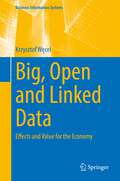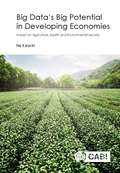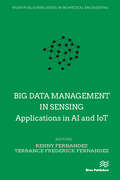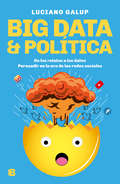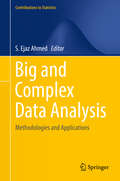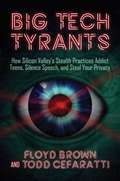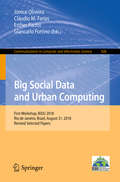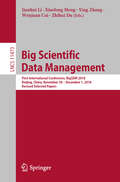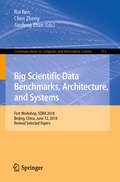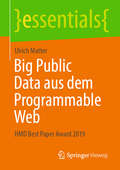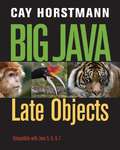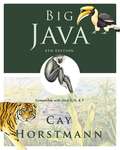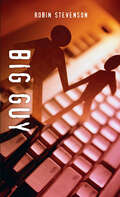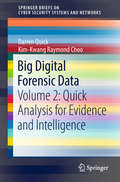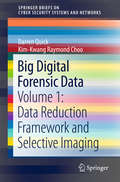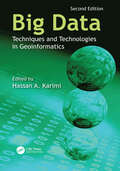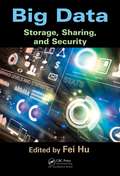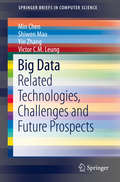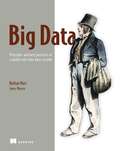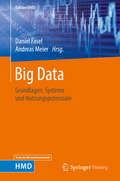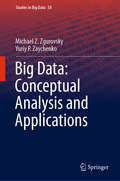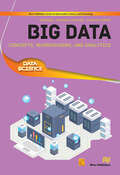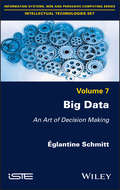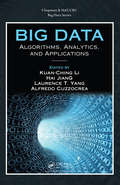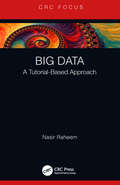- Table View
- List View
Big, Open and Linked Data: Effects and Value for the Economy (Business Information Systems)
by Krzysztof WęcelThis book examines the recent evolution of the concept of data as an economic and managerial phenomenon. The author first describes and discusses open data and then introduces the concept of linked data, with a focus on assets for reuse. Furthermore, he addresses the main challenges of big data. Value is identified as the main incentive for the adoption of linked data; accordingly, the next two chapters study sources of data value from a macroeconomic and micro economic perspective, respectively. This contributes to the systematization of important issues at the crossroads of enterprise data and data sharing: data ownership, personal data, and data privacy. In turn, the book reveals the role of innovation as a main vehicle for creating value by unifying big, open, and linked data. It studies the ways in which value can be created, transferred, and captured in the form of business models, before the closing chapter verifies the data unification model by combining open and linked geographical data with big data from a major telecom company.
Big data's big potential in developing economies: impact on agriculture, health and environmental security
by Nir KshetriBig data involves the use of sophisticated analytics to make decisions based on large-scale data inputs. It is set to transform agriculture, environmental protection and healthcare in developing countries. This book critically evaluates the developing big data industry and market in these countries and gives an overview of the determinants, performances and impacts. The book provides a detailed analysis of technology creation, technology infrastructures and human skills to utilize big data in these countries. It discusses novel applications and business models involving big data to overcome healthcare barriers. The book also offers an analysis of big data's potential to improve environmental monitoring and protection. It posits that big data is likely to have far-reaching and profound impacts on the agricultural sector. A key question addressed is also how gains in agricultural productivity associated with big data will benefit smallholder farmers relative to global multinationals in that sector. It also probes big data's roles in the creation of markets that can improve the welfare of smallholder farmers. The book gives special consideration to big data-led transformation of the financial industry and discusses how the transformation can increase small-holder farmers' access to finance by changing the way lenders assess creditworthiness of potential borrowers. It also takes a look at data privacy and security issues facing smallholder farmers and reviews differences in such issues in industrialized and developing countries. The key ideas, concepts and theories presented are explored, illustrated and contrasted through in-depth case studies of developing world-based big data companies and deployment and utilization big data in agriculture, environmental protection and healthcare.
Big data management in Sensing: Applications in AI and IoT
by Renny Fernandez Terrance Frederick FernandezThe book is centrally focused on human computer Interaction and how sensors within small and wide groups of Nano-robots employ Deep Learning for applications in industry. It covers a wide array of topics that are useful for researchers and students to gain knowledge about AI and sensors in nanobots. Furthermore, the book explores Deep Learning approaches to enhance the accuracy of AI systems applied in medical robotics for surgical techniques. Secondly, we plan to explore bio-nano-robotics, which is a field in nano-robotics, that deals with automatic intelligence handling, self-assembly and replication, information processing and programmability.
Big data & Política: De los relatos a los datos. Persuadir en la era de las redes sociales
by Luciano GalupEl primer libro de uno de los analistas de marketing y consultoría con mayor proyección de los últimos años; un análisis pormenorizado de cómo la información se ha convertido en uno de los bienes más valiosos y las redes sociales en el medio esencial para la comunicación política en lo que va del siglo XXI. Vivimos en la era de los datos. Casi toda la actividad humana deja una huella digital que es almacenable y analizable. Los datos y las redes sociales se han convertido en una herramienta clave para la comunicación de nuestras sociedades y también para la orientación del debate público. Una parte cada vez más importante de los recursos de campañas políticas y de gobierno se destinan a las estrategias de análisis de datos y de comunicación digital. También crece el interés de los ciudadanos por el uso de los datos y de las redes sociales como mecanismos de participación y de seducción de voluntades. Casos como el de Cambridge Analytica y Facebook o la popularización de términos como "postverdad" o "noticias falsas" (fake news) amplificaron la difusión y el interés en las estrategias de comunicación política orientadas a redes sociales y la manipulación de información de los usuarios. Luciano Galup, uno de los mayores expertos argentinos en comunicación digital, analiza las transformaciones que estos medios revolucionarios entrañan para la política y para nuestra vida diaria. Explora cómo nos estamos adaptando a un mundo que produce cantidades desproporcionadas de información a velocidades irrefrenables. Estudia cómo se construye un candidato electoral en base a los datos sobre los votantes, en un contexto de fragmentación y microculturas, en el que un político ya no sólo debe saber hablar sino aprender a escuchar; y, a su vez, cómo se garantiza una participación amplia, transparente y genuina de la ciudadanía en el debate público. Y se pregunta, sobre todo, cómo comunicarse más y mejor para devolverle prestigio y credibilidad a la política y a la información, de cara a un mundo nuevo lleno de incertidumbres y grandes posibilidades.
Big and Complex Data Analysis: Methodologies and Applications (Contributions to Statistics)
by S. Ejaz AhmedThis volume conveys some of the surprises, puzzles and success stories in high-dimensional and complex data analysis and related fields. Its peer-reviewed contributions showcase recent advances in variable selection, estimation and prediction strategies for a host of useful models, as well as essential new developments in the field. The continued and rapid advancement of modern technology now allows scientists to collect data of increasingly unprecedented size and complexity. Examples include epigenomic data, genomic data, proteomic data, high-resolution image data, high-frequency financial data, functional and longitudinal data, and network data. Simultaneous variable selection and estimation is one of the key statistical problems involved in analyzing such big and complex data. The purpose of this book is to stimulate research and foster interaction between researchers in the area of high-dimensional data analysis. More concretely, its goals are to: 1) highlight and expand the breadth of existing methods in big data and high-dimensional data analysis and their potential for the advancement of both the mathematical and statistical sciences; 2) identify important directions for future research in the theory of regularization methods, in algorithmic development, and in methodologies for different application areas; and 3) facilitate collaboration between theoretical and subject-specific researchers.
Big Tech Tyrants: How Silicon Valley's Stealth Practices Addict Teens, Silence Speech, and Steal Your Privacy
by Floyd Brown Todd CefarattiThey are driven without respect for the lives they are changing…“Boy Kings,” or Big Tech Tyrants, are considered the most powerful individuals in the world. They’re the autocratic aristocrats who run the tech giants in Silicon Valley, and if the labels are accurate, they suggest these social platform operators have gained a non-elected (or, should we say, a self-elected) authoritarian power. They wield it with more effectiveness and precision than any sitting government or military strategist. Big Tech Tyrants boast riches beyond emperors of old but act like juveniles who don’t want to grow up. They are modern-day robber barons. Big Tech Tyrants don’t know the meaning of privacy, when it comes to you. They try to make you believe they will give their products away for free as a service to society, when really, they are vacuuming your personal data. They use this data to discover your deepest secrets. Are you or your partner trying to get pregnant? Are you underwater financially? Are you having an extramarital affair? Do you have a tidy nest egg? Are you a Trump supporter? Are you a Bernie Sanders follower? Are you a Scientologist, Mormon, Christian, or Buddhist? Your personal data is extremely valuable to them—and they use it—and abuse. These tyrants knowingly addict users to make more money. Not only that, they also consider themselves the most enlightened the world has ever seen—so they know what’s best for you to see—from the news and information you read to the political candidates they think you should vote for. They censor news and only let you see what they want you to see. This is an eye-opening must read for anyone living in the twenty-first century!
Big Social Data and Urban Computing: First Workshop, Bidu 2018, Rio De Janeiro, Brazil, August 31, 2018, Revised Selected Papers (Communications in Computer and Information Science #926)
by Giancarlo Fortino Esther Pacitti Jonice Oliveira Claudio M. FariasThis book constitutes the thoroughly refereed proceedings of the First Big Social Data and Urban Computing Workshop, BiDU 2018, held in Rio de Janeiro, Brazil, in August 2018. The 11 full papers presented were carefully reviewed and selected from 40 submissions. The papers are organized in topical sections on urban mobility, urban sensing, contemporary social problems, collaboration and crowdsourcing.
Big Scientific Data Management: First International Conference, BigSDM 2018, Beijing, China, November 30 – December 1, 2018, Revised Selected Papers (Lecture Notes in Computer Science #11473)
by Ying Zhang Xiaofeng Meng Jianhui Li Wenjuan Cui Zhihui DuThis book constitutes the refereed proceedings of the First International Conference on Big Scientific Data Management, BigSDM 2018, held in Beijing, Greece, in November/December 2018. The 24 full papers presented together with 7 short papers were carefully reviewed and selected from 86 submissions. The topics involved application cases in the big scientific data management, paradigms for enhancing scientific discovery through big data, data management challenges posed by big scientific data, machine learning methods to facilitate scientific discovery, science platforms and storage systems for large scale scientific applications, data cleansing and quality assurance of science data, and data policies.
Big Scientific Data Benchmarks, Architecture, and Systems: First Workshop, SDBA 2018, Beijing, China, June 12, 2018, Revised Selected Papers (Communications in Computer and Information Science #911)
by Jianfeng Zhan Rui Ren Chen ZhengThis book constitutes the refereed proceedings of the First Workshop on Big Scientific Data Benchmarks, Architecture, and Systems, SDBA 2018, held in Beijing, China, in June 2018. The 10 revised full papers presented were carefully reviewed and selected from 22 submissions. The papers are organized in topical sections on benchmarking; performance optimization; algorithms; big science data framework.
Big Public Data aus dem Programmable Web: HMD Best Paper Award 2019 (essentials)
by Ulrich MatterDie Verbreitung des Internets und die zunehmende Digitalisierung in der öffentlichen Verwaltung und Politik haben über die letzten Jahre zu einer starken Zunahme an hochdetaillierten digitalen Datenbeständen über politische Akteure und Prozesse geführt. Diese big public data werden oft über programmatische Schnittstellen (Web APIs; programmable Web) verbreitet, um die Einbettung der Daten in anderen Webanwendungen zu vereinfachen. Die Analyse dieser Daten für wissenschaftliche Zwecke in der politischen Ökonomie und Politologie ist vielversprechend, setzt jedoch die Implementierung einer data pipeline zur Beschaffung und Aufbereitung von Daten aus dem programmable Web voraus. Dieses Buch diskutiert die Chancen und Herausforderungen der praktischen Nutzung dieser Datenbestände für die empirische Forschung und zeigt anhand einer Fallstudie ein mögliches Vorgehen zur systematischen Analyse von big public data aus dem programmable Web auf.
Big Java: Late Objects
by Cay HorstmannBig Java: Late Objects is a comprehensive introduction to Java and computer programming, which focuses on the principles of programming, software engineering, and effective learning. It is designed for a two-semester first course in programming for computer science students.
Big Java: Compatible with Java 5, 6 and 7 (4th Edition)
by Cay S. HorstmannThis book introduces programmers to objects at a gradual pace. The syntax boxes are revised to show typical code examples rather than abstract notation. This includes optional example modules using Alice and Greenfoot. The examples feature annotations with dos and don'ts along with cross references to more detailed explanations in the text. New tables show a large number of typical and cautionary examples. New programming and review problems are also presented that ensure a broad coverage of topics. In addition, Java 7 features are included to provide programmers with the most up-to-date information.
Big Guy (Orca Soundings)
by Robin StevensonDerek thinks he might be falling in love. The problem is, he hasn't been entirely honest with his online boyfriend. Derek sent Ethan a photo taken before he got depressed and gained eighty pounds. Derek hasn't been honest with his employer either. When he lied about his age and experience to get a job with disabled adults, the last thing he expected was to meet a woman like Aaliyah. Smart, prickly and often difficult, Aaliyah challenges Derek's ideas about honesty and trust. Derek has to choose whether to risk telling the truth or to give up the most important relationship in his life.
Big Digital Forensic Data: Volume 2: Quick Analysis for Evidence and Intelligence (SpringerBriefs on Cyber Security Systems and Networks)
by Kim-Kwang Raymond Choo Darren QuickThis book provides an in-depth understanding of big data challenges to digital forensic investigations, also known as big digital forensic data. It also develops the basis of using data mining in big forensic data analysis, including data reduction, knowledge management, intelligence, and data mining principles to achieve faster analysis in digital forensic investigations. By collecting and assembling a corpus of test data from a range of devices in the real world, it outlines a process of big digital forensic data analysis for evidence and intelligence. It includes the results of experiments on vast volumes of real digital forensic data. The book is a valuable resource for digital forensic practitioners, researchers in big data, cyber threat hunting and intelligence, data mining and other related areas.
Big Digital Forensic Data: Volume 2: Quick Analysis For Evidence And Intelligence (SpringerBriefs On Cyber Security Systems And Networks)
by Kim-Kwang Raymond Choo Darren QuickThis book provides an in-depth understanding of big data challenges to digital forensic investigations, also known as big digital forensic data. It also develops the basis of using data mining in big forensic data analysis, including data reduction, knowledge management, intelligence, and data mining principles to achieve faster analysis in digital forensic investigations. By collecting and assembling a corpus of test data from a range of devices in the real world, it outlines a process of big data reduction, and evidence and intelligence extraction methods. Further, it includes the experimental results on vast volumes of real digital forensic data. The book is a valuable resource for digital forensic practitioners, researchers in big data, cyber threat hunting and intelligence, data mining and other related areas.
Big Data: Techniques and Technologies in Geoinformatics
by Hassan A. KarimiOver the past decade, since the publication of the first edition, there have been new advances in solving complex geoinformatics problems. Advancements in computing power, computing platforms, mathematical models, statistical models, geospatial algorithms, and the availability of data in various domains, among other things, have aided in the automation of complex real-world tasks and decision-making that inherently rely on geospatial data. Of the many fields benefiting from these latest advancements, machine learning, particularly deep learning, virtual reality, and game engine, have increasingly gained the interest of many researchers and practitioners. This revised new edition provides up-to-date knowledge on the latest developments related to these three fields for solving geoinformatics problems.FEATURES Contains a comprehensive collection of advanced big data approaches, techniques, and technologies for geoinformatics problems Provides seven new chapters on deep learning models, algorithms, and structures, including a new chapter on how spatial metaverse is used to build immersive realistic virtual experiences Presents information on how deep learning is used for solving real-world geoinformatics problems This book is intended for researchers, academics, professionals, and students in such fields as computing and information, civil and environmental engineering, environmental sciences, geosciences, geology, geography, and urban studies.
Big Data: Storage, Sharing, and Security
by Fei HuAlthough there are already some books published on Big Data, most of them only cover basic concepts and society impacts and ignore the internal implementation details-making them unsuitable to R&D people. To fill such a need, Big Data: Storage, Sharing, and Security examines Big Data management from an R&D perspective. It covers the 3S desi
Big Data: Related Technologies, Challenges and Future Prospects (SpringerBriefs in Computer Science)
by Min Chen Shiwen Mao Yin Zhang Victor C. M. LeungThis Springer Brief provides a comprehensive overview of the background and recent developments of big data. The value chain of big data is divided into four phases: data generation, data acquisition, data storage and data analysis. For each phase, the book introduces the general background, discusses technical challenges and reviews the latest advances. Technologies under discussion include cloud computing, Internet of Things, data centers, Hadoop and more. The authors also explore several representative applications of big data such as enterprise management, online social networks, healthcare and medical applications, collective intelligence and smart grids. This book concludes with a thoughtful discussion of possible research directions and development trends in the field. Big Data: Related Technologies, Challenges and Future Prospects is a concise yet thorough examination of this exciting area. It is designed for researchers and professionals interested in big data or related research. Advanced-level students in computer science and electrical engineering will also find this book useful.
Big Data: Principles and best practices of scalable realtime data systems
by James Warren Nathan MarzSummaryBig Data teaches you to build big data systems using an architecture that takes advantage of clustered hardware along with new tools designed specifically to capture and analyze web-scale data. It describes a scalable, easy-to-understand approach to big data systems that can be built and run by a small team. Following a realistic example, this book guides readers through the theory of big data systems, how to implement them in practice, and how to deploy and operate them once they're built.Purchase of the print book includes a free eBook in PDF, Kindle, and ePub formats from Manning Publications.About the BookWeb-scale applications like social networks, real-time analytics, or e-commerce sites deal with a lot of data, whose volume and velocity exceed the limits of traditional database systems. These applications require architectures built around clusters of machines to store and process data of any size, or speed. Fortunately, scale and simplicity are not mutually exclusive.Big Data teaches you to build big data systems using an architecture designed specifically to capture and analyze web-scale data. This book presents the Lambda Architecture, a scalable, easy-to-understand approach that can be built and run by a small team. You'll explore the theory of big data systems and how to implement them in practice. In addition to discovering a general framework for processing big data, you'll learn specific technologies like Hadoop, Storm, and NoSQL databases.This book requires no previous exposure to large-scale data analysis or NoSQL tools. Familiarity with traditional databases is helpful.What's InsideIntroduction to big data systemsReal-time processing of web-scale dataTools like Hadoop, Cassandra, and StormExtensions to traditional database skillsAbout the AuthorsNathan Marz is the creator of Apache Storm and the originator of the Lambda Architecture for big data systems. James Warren is an analytics architect with a background in machine learning and scientific computing.Table of ContentsA new paradigm for Big DataPART 1 BATCH LAYERData model for Big DataData model for Big Data: IllustrationData storage on the batch layerData storage on the batch layer: IllustrationBatch layerBatch layer: IllustrationAn example batch layer: Architecture and algorithmsAn example batch layer: ImplementationPART 2 SERVING LAYERServing layerServing layer: IllustrationPART 3 SPEED LAYERRealtime viewsRealtime views: IllustrationQueuing and stream processingQueuing and stream processing: IllustrationMicro-batch stream processingMicro-batch stream processing: IllustrationLambda Architecture in depth
Big Data: Grundlagen, Systeme und Nutzungspotenziale (Edition HMD)
by Andreas Meier Daniel FaselDieser Herausgeber-Band bietet eine umfassende Einführung in das Gebiet Big Data. Neben einer Markteinschätzung und grundlegenden Konzepten (semantische Modellbildung, Anfragesprachen, Konsistenzgewährung etc. ) werden wichtige NoSQL-Systeme (Key/Value Store, Column Store, Document Store, Graph Database) vorgestellt und erfolgreiche Anwendungen aus unterschiedlichen Perspektiven erläutert. Eine Diskussion rechtlicher Aspekte und ein Vorschlag zum Berufsbild des Data Scientist runden das Buch ab. Damit erhält die Leserschaft Handlungsempfehlungen für die Nutzung von Big-Data-Technologien im Unternehmen.
Big Data: Conceptual Analysis and Applications (Studies in Big Data #58)
by Yuriy P. Zaychenko Michael Z. ZgurovskyThe book is devoted to the analysis of big data in order to extract from these data hidden patterns necessary for making decisions about the rational behavior of complex systems with the different nature that generate this data. To solve these problems, a group of new methods and tools is used, based on the self-organization of computational processes, the use of crisp and fuzzy cluster analysis methods, hybrid neural-fuzzy networks, and others. The book solves various practical problems. In particular, for the tasks of 3D image recognition and automatic speech recognition large-scale neural networks with applications for Deep Learning systems were used. Application of hybrid neuro-fuzzy networks for analyzing stock markets was presented. The analysis of big historical, economic and physical data revealed the hidden Fibonacci pattern about the course of systemic world conflicts and their connection with the Kondratieff big economic cycles and the Schwabe–Wolf solar activity cycles. The book is useful for system analysts and practitioners working with complex systems in various spheres of human activity.
Big Data: Concepts, Warehousing, and Analytics
by Carlos Costa Maribel Yasmina SantosBig Data is a concept of major relevance in today’s world, sometimes highlighted as a key asset for productivity growth, innovation, and customer relationship, whose popularity has increased considerably during the last years. Areas like smart cities, manufacturing, retail, finance, software development, environment, digital media, among others, can benefit from the collection, storage, processing, and analysis of Big Data, leveraging unprecedented data-driven workflows and considerably improved decision-making processes.The concept of a Big Data Warehouse (BDW) is emerging as either an augmentation or a replacement of the traditional Data Warehouse (DW), a concept that has a long history as one of the most valuable enterprise data assets. Nevertheless, research in Big Data Warehousing is still in its infancy, lacking an integrated and validated approach for designing and implementing both the logical layer (data models, data flows, and interoperability between components) and the physical layer (technological infrastructure) of these complex systems. This book addresses models and methods for designing and implementing Big Data Systems to support mixed and complex decision processes, giving special attention to BDWs as a way of efficiently storing and processing batch or streaming data for structured or semi-structured analytical problems.
Big Data: An Art of Decision Making
by Eglantine SchmittManipulating and processing masses of digital data is never a purely technical activity. It requires an interpretative and exploratory outlook – already well known in the social sciences and the humanities – to convey intelligible results from data analysis algorithms and create new knowledge. Big Data is based on an inquiry of several years within Proxem, a software publisher specializing in big data processing. The book examines how data scientists explore, interpret and visualize our digital traces to make sense of them, and to produce new knowledge. Grounded in epistemology and science and technology studies, Big Data offers a reflection on data in general, and on how they help us to better understand reality and decide on our daily actions.
Big Data: Algorithms, Analytics, and Applications (Chapman And Hall/crc Big Data Ser.)
by Hai Jiang Alfredo Cuzzocrea Laurence T. Yang Kuan-Ching LiAs today's organizations are capturing exponentially larger amounts of data than ever, now is the time for organizations to rethink how they digest that data. Through advanced algorithms and analytics techniques, organizations can harness this data, discover hidden patterns, and use the newly acquired knowledge to achieve competitive advantages.Pre
Big Data: A Tutorial-Based Approach
by Nasir RaheemBig Data: A Tutorial-Based Approach explores the tools and techniques used to bring about the marriage of structured and unstructured data. It focuses on Hadoop Distributed Storage and MapReduce Processing by implementing (i) Tools and Techniques of Hadoop Eco System, (ii) Hadoop Distributed File System Infrastructure, and (iii) efficient MapReduce processing. The book includes Use Cases and Tutorials to provide an integrated approach that answers the ‘What’, ‘How’, and ‘Why’ of Big Data. Features Identifies the primary drivers of Big Data Walks readers through the theory, methods and technology of Big Data Explains how to handle the 4 V’s of Big Data in order to extract value for better business decision making Shows how and why data connectors are critical and necessary for Agile text analytics Includes in-depth tutorials to perform necessary set-ups, installation, configuration and execution of important tasks Explains the command line as well as GUI interface to a powerful data exchange tool between Hadoop and legacy r-dbms databases
